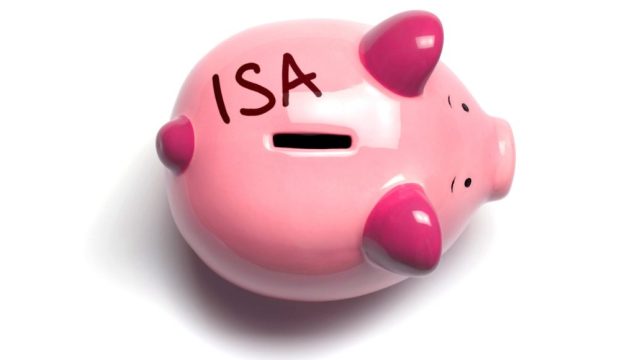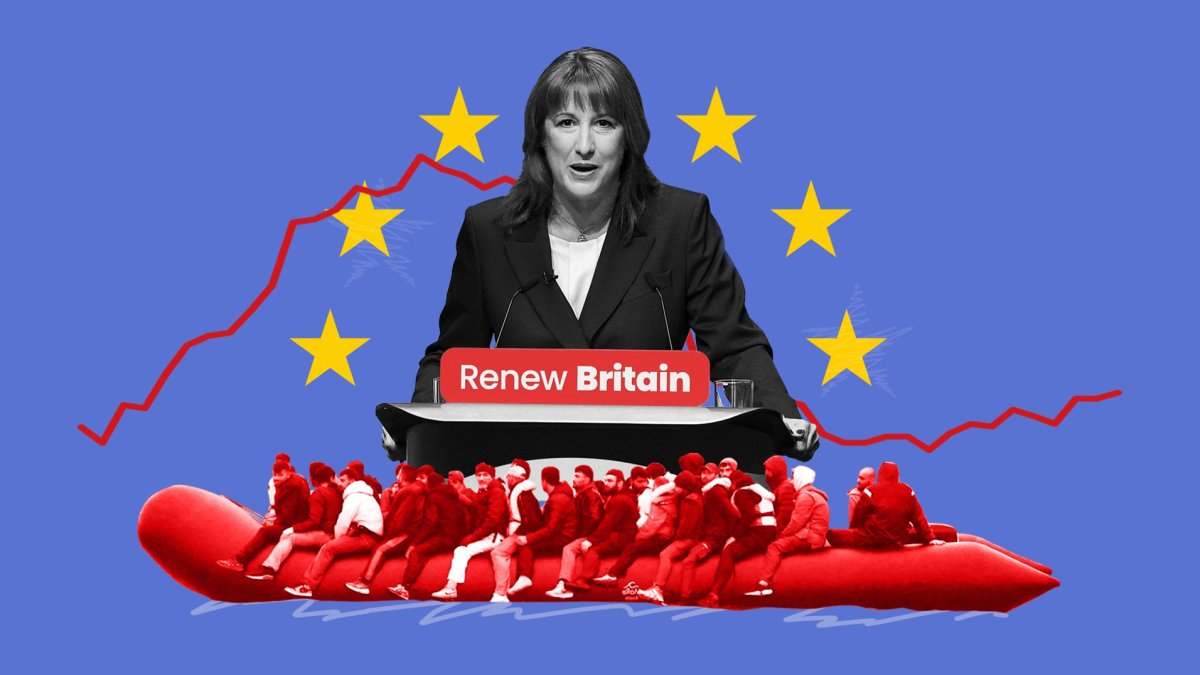No 10 is starting to pin the blame for the UK’s sluggish economy on the Tories’ Brexit deal
It’s fair to say Brexit has been the single most divisive issue in British politics for a generation. Which is perhaps why, much like the aftermath of an explosive family row, many politicians have been wary of returning to it.
It has been fine for Brexiteers to champion Brexit – that is what the UK voted for – but any hint of criticism or lingering Remainerism, has been fairly taboo.
Labour, in particular, has steered clear especially since Keir Starmer became leader. Strategists feared that reminding Leave voters – many of them natural Labour supporters in the Red Wall – that Starmer was at the forefront of calls for a second referendum would torpedo their election chances.
New FeatureIn ShortQuick Stories. Same trusted journalism.
Brexit is done, let’s move on, seemed to be the verdict of a weary electorate.
The difficulty for Labour is that Brexit might be done, but its aftermath is not. And the party has seemed to recognise this.
In power the party carefully crafted a message that Labour would “fix” the Brexit deal, but in a limited way, resulting in the Prime Minister’s Brexit reset.
Recent weeks have seen a more definite shift in strategy with senior ministers, including Starmer, explicitly criticising the impact of Brexit on the economy and attacks on arch-Leaver Nigel Farage.
This culminated in Chancellor Rachel Reeves setting up what is likely to be a brutal Budget with warnings that quitting the EU has lead to a downgrade in economic growth.
A risky strategy
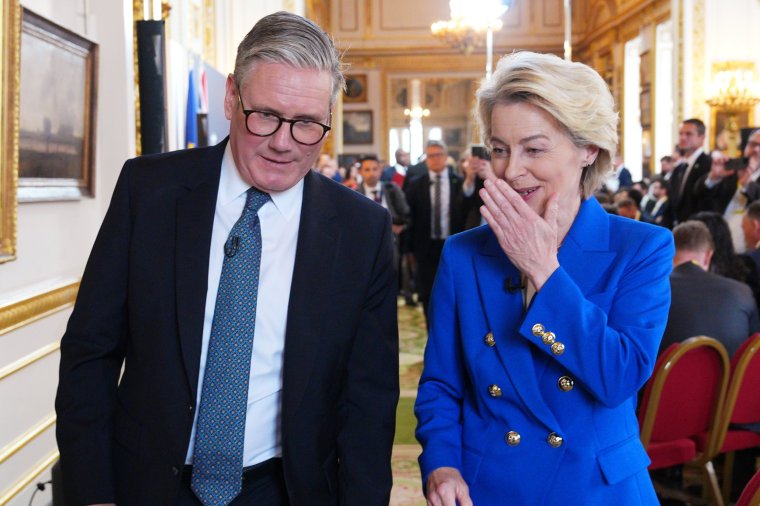 Keir Starmer and President of the European Commission, Ursula von der Leyen, chatting at the UK-EU summit in London, in May (Photo: Carl Court/Getty Images)
Keir Starmer and President of the European Commission, Ursula von der Leyen, chatting at the UK-EU summit in London, in May (Photo: Carl Court/Getty Images)
It’s a risky strategy. Critics will accuse the government of attempting to shift the blame for the poor economy and of upsetting crucial Red Wall Leave voters.
Government sources say the move is about setting dividing lines with Reform and the Conservatives with an eye on the next general election, and getting business backing, with the message being: “Vote for these lot and we’ll go back to square one”.
Crucially, they want to blame the Brexit deal negotiated by Boris Johnson, rather than Brexit itself.
But pro-EU MPs warn that diagnosing Brexit as the problem without a more ambitious plan to deepen trade ties with Brussels risks backfiring.
Pollsters say it either looks to voters like a weak excuse, or allows Farage to claim he is the man to fix the situation as he had no involvement in negotiating the UK’s exit.
While economists have since suggested it is wrong to blame Brexit alone for the UK’s poor performance, a Treasury source said they expect the Budget watchdog to mention trade barriers, which were a result of the Conservatives’ hard Brexit, as a contributing factor for a downgrade in growth figures.
The source said Reeves is simply trying to explain why the Office for Budget Responsibility (OBR) will downgrade growth in a way that voters understand, as productivity is a “complicated” and “difficult” concept.
“It isn’t about re-running the referendum and also I don’t think that’s what the public think we are saying,” the source said.
“It is saying: if the country’s economy is less productive because of some of the trade barriers produced by Brexit, what are you going to do about it?
“We have got a closer relationship with the EU and we have also struck trade deals with India and the US that everyone said the UK would get [as a result of Brexit].
“It is about saying Brexit has a cost… but we are doing something about it.”
Dividing lines with Reform and the Tories
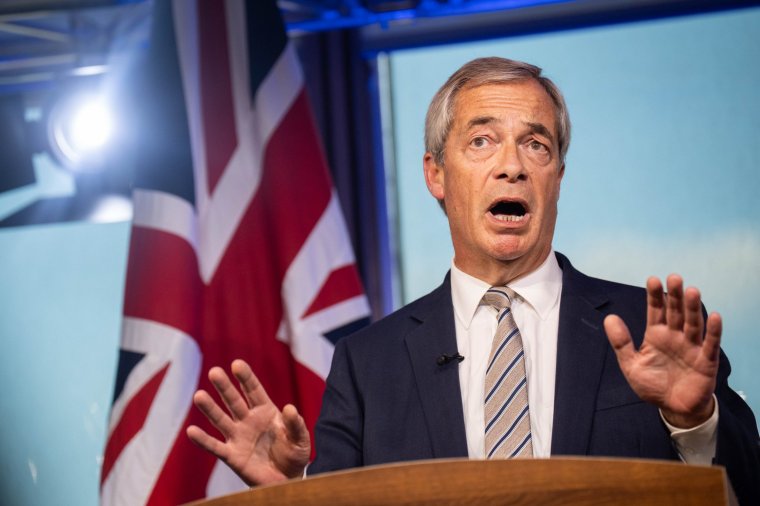 Labour want to create a clear dividing line between it and Reform and Nigel Farage (Photo: James Manning/PA)
Labour want to create a clear dividing line between it and Reform and Nigel Farage (Photo: James Manning/PA)
The approach is also designed to create dividing lines with Farage’s Reform and the Tories, who have said they will reverse the Brexit reset deals, and will feed directly into Labour’s plan to stay in power at the next election.
“It is certainly about setting up the politics of the next election which is to say: look, Brexit had a cost, everyone recognises that, but we have begun to mitigate it,” the Treasury source said.
“You vote for these lot and we’ll go back to square one.”
And it is aimed at businesses, who have been critical of Reeves over workers’ rights, raising the minimum wage, and the National Insurance hike for employers.
“For understandable reasons, businesses are not happy with some of the things we’ve done,” the source said, perhaps alluding to raising employers National Insurance contributions.
“But for understandable reasons they are also very happy with what we have done, the reaction to the trade deals has been very encouraging.
“Reform and the Tories would rip those deals up, they are opposed to them.”
The source added: “It is also about setting up the divides for three years time, four years time, whatever it is.”
Government sources also acknowledge an attempt to lean into perhaps Starmer’s only strength in office so far, his performance on the world stage.
One said: “Keir Starmer has put in the hard yards to improve Britain’s standing in the world.
“Compare that to Nigel Farage who can’t bring himself to have any relationship with Europe, and wants to see the country divided.
“He would love to drag the UK back into perma-chaos – it is the fuel for his model of nasty politics.”
EU Relations Minister Nick Thomas-Symonds is seen as a driving force behind the Government’s shift in messaging, having incrementally developed an argument for closer EU trade ties and beginning to deliver on it, while avoiding a Leave voter backlash.
In summer recess, No 10 was closely involved in a speech in which Thomas-Symonds explicitly tied Brexit to an attack on Farage, who he said would “take Britain backwards”.
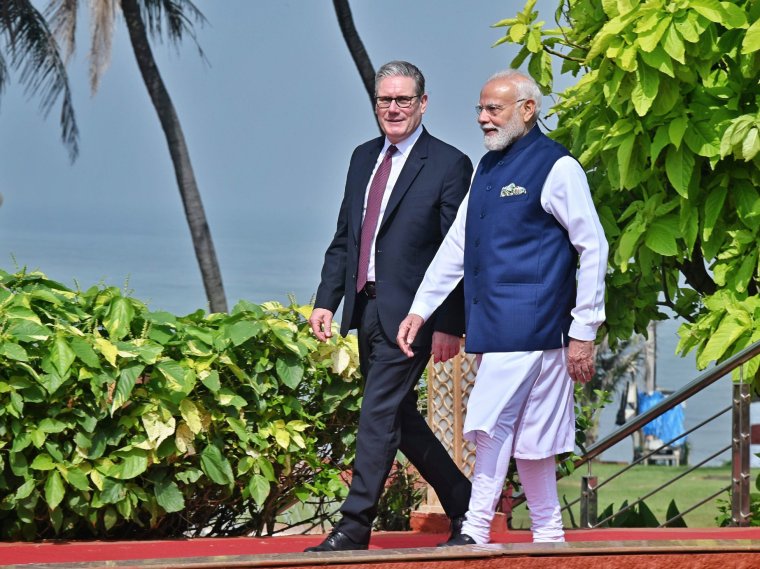 Keir Starmer signed a new trade deal with India’s Prime Minister Narendra Modi (Photo: Press Information Bureau (PIB) /Anadolu/Getty Images)
Keir Starmer signed a new trade deal with India’s Prime Minister Narendra Modi (Photo: Press Information Bureau (PIB) /Anadolu/Getty Images)
Missteps and Downing Street splits
It was picked up by Starmer in his crunch party conference speech last month, before being given rocket boosters by Reeves.
But there have been missteps along the way, including reports of splits in Downing Street over the approach.
The i Paper understands this is because those driving the message are keen to focus on the failures of the Brexit deal negotiated by the Tories rather than leaving the EU itself.
But a briefing to the Times that Brexit itself was to blame set alarm bells ringing in Whitehall.
There is confidence in the Government however that their approach, as long as it focuses on the implementation of Brexit, is in tune with voters.
Labour MPs are broadly supportive of the move, and there has been no backlash in the Red Wall, with Government sources saying their own data suggests voters are onside.
The new messaging is however not yet being matched by fresh ambition to go further in the reset, with some senior EU figures keen to agree new “ambitions” as soon as at next year’s summit.
But pro-EU Labour MPs warn that diagnosing Brexit as the problem without coming up with a more ambitious solution is “politically bold”, with some still pushing for a form of customs union with the EU.
Labour Movement for Europe chair Stella Creasy said: “Recognising just how damaging Brexit has been means we must also recognise the scale of the challenge to repair it – that means the case for building on the work to date.”
One MP suggested the messaging would at least help unite centre-left voters against Farage, as appears to have happened in the Caerphilly Senedd by-election on Friday: “We need to make sure there’s an offer to the progressive flank”.
Farage ‘gets away with so much’
But pollsters warn it is a high-risk strategy.
More In Common’s Luke Tryl said: “Farage’s defence to this could be: ‘Well yeah, it hasn’t been a good Brexit because I wasn’t in charge, and if I get into power I will organise the type of Brexit that takes advantage of the new-found freedoms’.
“I actually think it’s quite a dangerous strategy from Labour.”
But he added it could work to shore up Labour’s base.
“The benefit of this argument is much less about taking Reform on directly and rallying progressives who are disillusioned with Brexit back to your cause.
“So particularly that chunk of voters they have lost to the Lib Dems – frustrated Remainers – making an argument about Brexit probably does make them more likely to come back to you.
“So it’s less about the head-to-head and more about Labour shoring up its Remainer flank.”
However, elections expert Lord Hayward said it was an “error”.
The Tory peer said: “It is reflective of the attacks on Reform at the party conference, which I also thought were wrong.
“People are looking for a sense of potential delivery, they have gone beyond accepting people blaming either the Conservatives or Reform or Ukip for the events of the past.
“It is now perceived by the ordinary person outside London as an excuse for not making progress on anything.”
Ultimately for some in Labour, it is simply about holding Farage – riding high in the polls – to account.
One party official said: “He gets a free pass on so much, it’s about time we made him pay the piper for the tune he’s had us dance to.
“I accept there’s an element of peril in such a strategy but he really does get away with so much.”
Your next read
